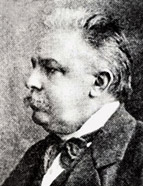

In short, this participation by Marques Gomes in volume XII of the História de Portugal under the direction of Pinheiro Chagas confirmed the importance of his historical writings in the national context and made him one of the members of the Academia de Ciências de Lisboa [Lisbon Academy of Sciences]. He had an obviously liberal view of national history, as well as local history and memory. However, in the last quarter of the 19th century, he made a transition to republican ideology. The creation of this ideological outlook is clearly evident in the concepts used throughout his studies. Concepts such as freedom and the moral progress of men are widely used by Marques Gomes in his studies, which strongly highlighted his hometown (Aveiro) as a bastion of the defence of these principles throughout the episodes of decadence in Portugal's history. This idea of freedom is also shared by Oliveira Martins ( História de Portugal , s.d., p. 529). One example of this liberal historiography is the valorisation of the celebrations of the centenary of the 1820 Liberal Revolution.
In his work Lutas Caseiras, he made strong use of quotations from deputies of the Constituent Courts and the military, intellectuals, ministerial decrees, and the periodical press of the time, the constituents of the various governments, and biographical notes on the ministers. Concepts such as revolution and counter-revolution are also frequent in the various ideological tendencies included in these quotations. There is no critical interpretation of this political-constitutional period of 19th century liberalism, but rather a narration of the political events of this time. As for his participation in volume XII of the História de Portugal by Pinheiro Chagas, there's clearly a transition in Marques Gomes' thinking—from liberal to republican ideas. Political events such as the Casino Democratic Conferences, the centenaries of Camões and Pombal, and the English Ultimatum confirm—according to Marques Gomes—the decline of the constitutional monarchy and the need for change that would make way for a future of progress and hope, which, in this case, would be the Republic. This was why Marques Gomes joined the new republican regime established on 5 October 1910.
This work is financed by national funds through FCT - Foundation for Science and Technology, I.P, in the scope of the projects UIDB/04311/2020 and UIDP/04311/2020.
